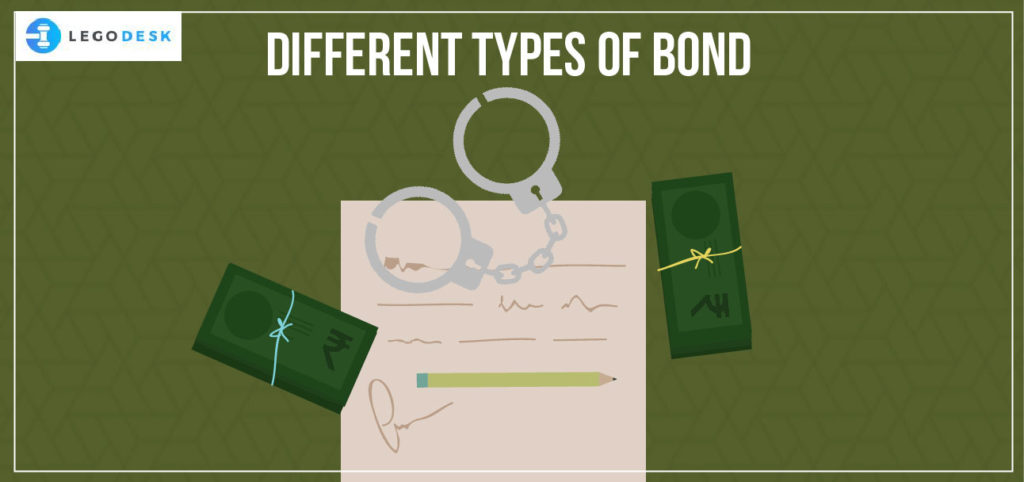Different Types of bond in India
Different Types of Bond in India

The history of bail and bonds can be traced back to 399BC when the famous Greek philosopher Plato tried to create a bond for the release of Socrates. The concept of bail in the modern era evolved from England and is widely used in many common law jurisdictions around the world, including India.
Bail bonds-
In Indian criminal jurisprudence, bail is a legal right given to the accused of procurement of release from prison of a person who is waiting for a trial or an appeal. The accused deposits security as an undertaking that he/she shall appear before the court at the time and place designated and thus, submit himself to the jurisdiction and judgment of the court. Bail hasn’t been defined in the Criminal Procedure Code, 1973. However, a distinction has been made between cognizable and non-cognizable offences under section 2(a) of the CrPC. It says “Bailable offence means an offence which is shown as bailable in the First Schedule or which is made bailable by any other law for the time being enforce, and non-bailable offence means any other offence.”
Section 436 to Section 450 outlines the provisions for grant of bail bonds in Indian criminal law. The provisions are as follows—-
Section 436 —— Cases in which bail can be granted
Section 437——-Cases when bail can be granted in case of a non-bailable offence
Section 438——-Direction for grant of bail to person apprehending arrest (Anticipatory bail)
Section 439——-Special powers of the High court or Court of Sessions regarding bail
Section 440——-Amount of bond and reduction thereof
Section 441——Bond of accused and sureties
Section 442——Discharge from custody
Section 443——Power to order sufficient bail when that first taken is insufficient
Section 444——Discharge of sureties
Section 445——Deposit instead of recognizance
Section 446——Procedure when a bond has been forfeited
Section 447——Procedure in case of insolvency of the death of surety or when a bond is forfeited
Section 448——Bond required from a minor
Section 449——Appeal from orders under section 446
Section 450—— Power to direct levy of the amount due on certain recognizances
Personal bonds
The Criminal Procedure Code, 1973 envisages two kinds of personal bonds –
a) A person furnishes his own bond with one or more sureties. It means that the third party (surety) will be held responsible for the obligations undertaken by the accused and that he’ll have to pay the amount in case a breach of bail is committed by the accused.
b) Execution of bond without sureties. In this case, a judge may allow the release of an accused on bail by taking a bond that he/she shall appear on all future court dates. Here the accused doesn’t have to post bail, but he will forfeit the amount in the bond if he fails to appear before the court.
Types of bail and bonds in India
a) Cash bonds – It is a type of bail bond wherein cash is paid for the full amount of the bail. It is paid when the defendant fails to appear in the court of law, as he was supposed to on a stipulated date. There is no provision for the refund of the cash.
b) Surety bonds– This type of bond comes into play when the surety is unable to their total bill in cash. They are issued by bail bondsmen. There are parties in such a bond – the obligee (the party who is the recipient of the obligation), the principal (the primary party who is supposed to perform the contractual obligation) and the surety (the person who assures the obligee that the principal can perform the task).
Specimen Form:
The following are specimens of a bond and bail-bond for attendance before the Court or an Officer-in-charge of a Police Station in India.
I, (name) of (place), having been arrested or detained without warrant by the Officer-in-charge of Police Station (or having been brought before the court of), charged with the offence of…………….. , and required to give security for my attendance before such Officer (or Court) on condition that I shall attend such Officer (or Court) on every day on which any investigation or trial is held with regard to such charge, and in case of my making default therein, I find myself to forfeit to Government the sum of Rupees five hundred.
Dated this 1st day of May 2018.
Conclusion-
The following can be considered before granting bail to the accused—
(1) The nature of the offence.
(2) His money related condition and work history.
(4) His character, reputation, and financial conditions.
(5) Prior criminal records, assuming any.
(6) The personality of the individuals who vouch for his unwavering quality.
(7) Any different components, contemplating the danger of the criminal’s inability to show up.
Article 21 of the Constitution gives us the Fundamental Right to life and liberty. Such right assures everybody in India to live a life with full liberty subject to reasonable restrictions. Be that as it may, the refusal of the privilege to safeguard or requesting the sum (bail) that a man can’t pay is said to be an encroachment of Article 21 of the Constitution of India.
Try our Debt Resolution solutions today Request a Demo
Excellent